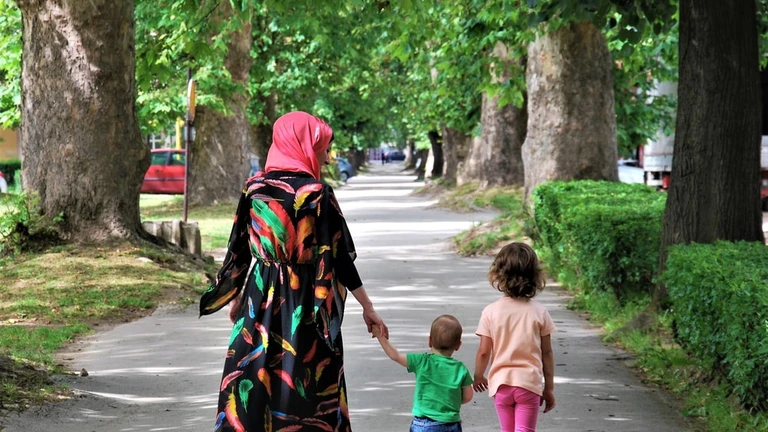Rachel sat on the edge of her bed and gazed out of the window, as she reflected on her journey as a Muslim mom.
Rachel is a thirty-five-year-old, devout Muslim woman who resides in the Northeastern region of the United States of America. She always prided herself on being a devoted, loving, and even self-sacrificing mom.
She was always told that good parenting meant your children are well mannered, possess the ability to perform well in school, are well aware of their Islamic principles, and consistently active in extracurricular activities.
Rachel worked assiduously to live up to this mom ideal until one day she came to an alarming halt.
This Hadith is often stated continuously in our religious spaces and it is enforced upon us to make sure they become hard-working, productive and most importantly, God-fearing individuals who will be an asset to the Ummah. This pressure is often left on the shoulders of mothers, as we are told continuously that we are the teachers and we are the ideal ones to raise our children.

Mom Burnout
In today’s age, it is no secret that raising children has drastically shifted from a village model to a very individualistic model.
It was only a few decades ago when parenting was the responsibility of the community. Everyone in your community helped raise your children and this created a healthy balance for mothers.
However, in the age of lawsuits and increased rights for children, community members are hesitant to get involved with the upbringing of any child other than their own. This has created an imbalance and a monumental shift in pressure on Muslim mothers to do it alone.
“I was forced to sit down one day, as I realized I was depressed and exhausted from trying to meet this unrealistic mother ideal. My children were tired and this wasn’t even what they wanted. I wanted to feel like I was doing right by my children,” Rachel Azzam told AboutIslam.net.
Mindset Shift
Although good parenting is highly encouraged in Islam and there are many tips to navigate this journey with ease, it never was intended to be done alone.
Historically, parenting fell on the backs of mothers but fathers also play an active role in parenting. Our beloved messenger, Prophet Muhammad (peace be upon him) was involved in the lives of his children and grandchildren. He played an active role in parenting them, raising them, and loving them.
“He (peace and blessings be upon him) loved his granddaughter Umamah (may Allah be pleased with her). He (PBUH) often went out with her on his shoulders, and even placed her on his shoulders while praying. When he (peace and blessings be upon him) prostrated, he (peace and blessings be upon him) put her down; when he (peace and blessings be upon him) had finished praying, he (peace and blessings be upon him) placed her on his back again,” (Muslim).
As a community, it is essential for us to understand the major role we all play in raising the next generation. Our mothers need support and balance from their partners, community members, and extended family members.
It is also extremely unrealistic to expect our mothers to take the role of being everywhere all of the time. These heavy schedules filled with school activities, sports, Islamic classes, and extracurricular activities are unrealistic to sustain on a continuous basis.

Strategies to Prevent Mom Burnout
1- Identify your village of helpers and supporters before you have your first child.
Many mothers are excited at the news of the birth of their first born child. Many women rush to the bookstore to buy the latest editions of cutting edge parenting books and join classes to help understand this new and amazing journey.
However, many American moms often forget to use this time to solicit community help and support before the baby arrives. Again, there is an expectation that mothers can and should do it alone, which is a detrimental perspective.
“I didn’t know I would need a support group before I had children. My mother was a single mom and I never saw her with any help. However, I realize now that this wasn’t healthy for my mom and she would burn out several times during the year,” Rachel told AboutIslam.net.
2- Schedule a meeting with your spouse and discuss parenting roles and responsibilities
It is extremely essential for there to be a conversation with your spouse about the role of parenting before the children arrive. Depending on how your spouse was raised, it may be taboo for a man to assist with raising the children and this is important to know early on.
“After my burnout, I sat my husband down and asked how he could help. I was honest about my depression and my needs. He told me he wasn’t aware of my struggles and became eagerly willing to do more to help me,” Rachel Azzam told AboutIslam.net.
3- Create a schedule that allows for rest and recovery
Although you will be faced with tremendous pressure from American soccer moms to create a schedule of constant activities for your children, it is important to identify a schedule that works for you. Extracurricular activities do not have to be provided every season. Driving your children from activity to activity creates a lifestyle of being a “taxi driver” mom. This is unhealthy and completely detrimental to the critical relationship between the mother and her child.
“I stopped all extracurricular activities. We were all tired and I was overspending all of my time behind the wheel of my car. I decided to incorporate one visit to the library a week. This was sustainable for me and my children actually loved it,” Rachel Azzam stated to AboutIslam.net.

